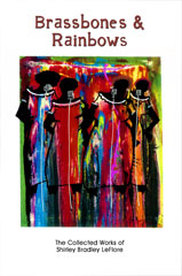Shirley Bradley LeFlore’s debut poetry book, Brassbones and Rainbows, is a vivid collection that uses a musical voice to address political and social issues. LeFlore’s word choice throughout her poems evoke the feelings of gospel and blues, and when reading the poems you don’t hear the writer’s voice speaking to you; it shouts and sings with passion you can feel in every line. Many of the poems in the collection are written in a voice that shouts from the page, making one picture the poet as one who is fighting against being silenced. While the words in the poems don’t specifically say who or what is trying to silence the poet, the undertone of racism and prejudice stands out as the ideology the poet is preaching against. The need to shout out loud and be heard is perhaps best expressed in the closing lines of her poem “Brass Reality,” which reads, “you can bury me in the east / you can bury me in the west / but I’m gonna rise-up and be a TRUMPET in the mawnin.” A reader might recognize these lines, and a Google search of them reveals similar lines in a gospel song, “You May Bury Me in the East.” LeFlore changes the message of the gospel in a simple yet riveting way. The gospel song repeats lines about Christians longing to fly away, and one memorable set of lines reads, “You may bury me in the east / You may bury me in the west / But I'll hear the trumpet sound / In that morning.” The line in the gospel verse indicates that the trumpet sound, playing somewhere off in the undefined distance, signifies hope with each new dawn. LeFlore’s poem, on the other hand, boldly declares that she won’t be waiting to hear the trumpet, but instead will rise up and be the trumpet, playing out loud to spread that hope.
LeFlore’s perspective as an African American southerner comes out clear in her choices of words that call out the stereotypes most commonly associated with her race. In one poem, “Sonnybrotherman Dance,” she writes about a man dancing in what feels like protest against oppression. She tells “Sonnybrotherman” to “Dance in a cotton field / a tobacca farm / a steelmill grind / on a watermelon rind.” The images thus evoked are of an oppressed man dancing to show his passion, his freedom. The poem then calls for the man to dance in order to rise above racism and climb above the insults and crude names he has been called. She tells him, “Dance that boy named colored down in the ground / Stomp that boy named nigga with your 200 pound / Dance that name deep.” These lines bring to mind an image of a man burying the names he has been called, “colored” and “nigga,” and continuing to dance as he leaves those names behind him, buried deep underground. Then, towards the end of the poem, she says, “You don paid your dues / Work a lil soft shoe / Dance your own tune.” These lines tell the message that the subject of the poem has earned the right to dance, and the freedom to dance in his own way, because of the price he had to pay to gain that freedom. LeFlore also uses a distinctly southern voice in her writing, using a grammar and style that immediately brings to mind a regional accent. She uses alternate spellings of many words to express the accent in them, such as in likes like, “cuz I got a gee-zus complex,” and “jus a box recycled, with a bag of ole bones.” Lines like these add to LeFlore’s distinct voice, and it’s easy to imagine, while reading these poems, LeFlore standing before you like a gospel preacher, shouting out the words. After reading LeFlore’s poems, one doesn’t have to know for themselves the struggles of being an African American woman living through oppression and fighting for her voice; reading these poems makes you feel as if you have experienced those struggles, and you can hear the fight in the voice on the page.
0 Comments
Leave a Reply. |
Archives
July 2024
Categories
All
|
|
Glassworks is a publication of Rowan University's Master of Arts in Writing 260 Victoria Street • Glassboro, New Jersey 08028 [email protected] |
All Content on this Site (c) 2024 Glassworks
|


 RSS Feed
RSS Feed
